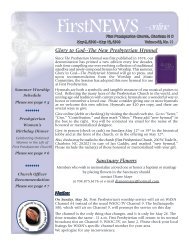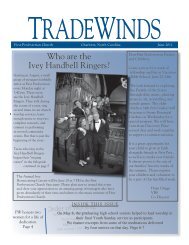“The Eclipse of God” - First Presbyterian Church
“The Eclipse of God” - First Presbyterian Church
“The Eclipse of God” - First Presbyterian Church
Create successful ePaper yourself
Turn your PDF publications into a flip-book with our unique Google optimized e-Paper software.
<strong>“The</strong> <strong>Eclipse</strong> <strong>of</strong> <strong>God”</strong><br />
a sermon by<br />
The Rev. Dr. James F. Miller<br />
<strong>First</strong> <strong>Presbyterian</strong> <strong>Church</strong><br />
Charlotte, North Carolina<br />
March 9, 2008<br />
Text: “I have seen the misery <strong>of</strong> my people in Egypt … ” (Exodus 3:7).<br />
Martin Buber, the 20 th century Jewish thinker, draws a pr<strong>of</strong>ound if puzzling distinction by posing<br />
a question in his little book, The <strong>Eclipse</strong> <strong>of</strong> God. His phraseology is compact and what he <strong>of</strong>fers<br />
us sounds like a riddle. But, it is no mere word play; it is a matter <strong>of</strong> life and death.<br />
When God seems unreal; when God seems distant; when God seems to be a make-believe; when<br />
God seems weak and incapable <strong>of</strong> action; when you and your loved ones are in the hell <strong>of</strong><br />
Auschwitz; when all this happens and God does not show up, how do we faithfully describe the<br />
experience? What is it we truly are experiencing, Buber asks? Is this terrifying darkness to be<br />
described as “the presence <strong>of</strong> the absence <strong>of</strong> God or the absence <strong>of</strong> the presence <strong>of</strong> God?”<br />
This is no casual form <strong>of</strong> Nietzsche’s “death <strong>of</strong> God.” Buber saw how whimsically shallow<br />
Nietzsche’s philosophical agony had been. Instead, he articulated a desperate agony; the<br />
desperate, real agony <strong>of</strong> faith.<br />
Is the terrifying darkness <strong>of</strong> life “the presence <strong>of</strong> the absence <strong>of</strong> God or the absence <strong>of</strong> the<br />
presence <strong>of</strong> God?”<br />
Perhaps you have never heard it asked this way. But you certainly have heard it asked: why have<br />
I got this terrible disease? What is God doing in the world; there is simply too much starvation,<br />
suffering, war, and death? Why did my little one, so innocent and full <strong>of</strong> the promise <strong>of</strong> life, have<br />
to die?<br />
How is this terrifying darkness <strong>of</strong> life to be described?<br />
The presence <strong>of</strong> the absence <strong>of</strong> God means simply this: the darkness is it. There is no help; there<br />
is no hope. That which you call God is the absent one; absence is his “reality;” he is that which<br />
can never be present.<br />
The absence <strong>of</strong> the presence <strong>of</strong> God is utterly different from this. You are experiencing bleak<br />
desperation, yes; you are in searing agony, yes; the darkness is all around, yes, and it is wholly
eal, yes. That which you call God is absent, yes. But, this absent one is yet known as the one<br />
who can be present; this absent one is yet known as the one will be present.<br />
We read a brief portion <strong>of</strong> Exodus 3, one <strong>of</strong> the pivotal chapters in the entire Bible. Moses, the<br />
runaway cop-killer, is being chosen by God to return to Egypt and lead the people out. It is the<br />
beginning <strong>of</strong> exodus; the beginning <strong>of</strong> freedom; the beginning <strong>of</strong> the end <strong>of</strong> the terrifying<br />
darkness for God’s people. For those slaves it is the beginning <strong>of</strong> the end <strong>of</strong> God’s absence. For<br />
them the absent one was about to become present. And how he did! The absent one showed up<br />
with uncompromising power; with clear and present danger to the powers <strong>of</strong> the world; with a<br />
singular purpose, to shock and awe without reservation all that would masquerade as divine by<br />
claiming to establish purpose for the world.<br />
Think <strong>of</strong> the facts for a moment.<br />
Consider: the people <strong>of</strong> Israel were slaves. Brought to Egypt through the Joseph adventure, there<br />
they had grown and prospered, but the day came, as the Bible ominously puts it, when there<br />
arose “a Pharaoh who knew not Joseph.” [Exodus 1:8] Pharaoh had ambitions; he had plans. As<br />
ever with the powers <strong>of</strong> the world those ambitions and plans required elevation <strong>of</strong> his own self;<br />
extension and amplification <strong>of</strong> his own power; making the first even more first and the last even<br />
more last. Pharaoh made slaves <strong>of</strong> the children <strong>of</strong> Israel. [There is only one more potent symbol<br />
<strong>of</strong> the world’s arrogant power than enslaving others. Can you imagine what it is?]<br />
All this is bad enough. But consider: it is even worse. In enslaving the children <strong>of</strong> Israel Pharaoh<br />
was containing God’s plan <strong>of</strong> salvation for the world. In enslaving the children <strong>of</strong> Israel,<br />
Pharaoh, the power <strong>of</strong> the world, was condemning the world to a life <strong>of</strong> eternal terrifying<br />
darkness, <strong>of</strong> living permanently with the absent one.<br />
Then consider this: our chapter <strong>of</strong> the call <strong>of</strong> Moses, while full <strong>of</strong> promise and heavy with hope<br />
for freedom and salvation, tells a story which took place 400 years after the enslavement began.<br />
400 years! It’s not that the people became slaves and after a week or so, a few months, a decade,<br />
the absent one showed up. Four centuries. This is twice the length <strong>of</strong> the history <strong>of</strong> the USA.<br />
Here then is the burning question <strong>of</strong> faith, a faith that believes the terrifying darkness and all its<br />
agony is but the absence <strong>of</strong> the presence <strong>of</strong> God—why? Why the delay? Why the suffering<br />
before the healing? Why the darkness before the light? Why?<br />
Why allow the insanity <strong>of</strong> the world to defeat even for one heartbeat the saving, life-bestowing<br />
purposes <strong>of</strong> God for the very world itself? Where is God when this happens? Where is the light<br />
<strong>of</strong> God’s presence in the midst <strong>of</strong> the darkness? Why is he absent, because he can’t show up, or<br />
because he chooses not to? Of these which is worse for the believing heart? Can we do anything<br />
other than embrace Dylan Thomas’s advice, “Do not go gentle into that good night, ... Rage, rage<br />
against the dying <strong>of</strong> the light”?<br />
God to Moses [Exodus 3:7] “I have indeed seen the misery <strong>of</strong> my people in Egypt. I have heard<br />
them crying out because <strong>of</strong> ... their suffering.” I have seen; I have heard. What? For 400 years?<br />
Why the delay?<br />
<strong>First</strong> <strong>Presbyterian</strong> <strong>Church</strong> Page 2 March 9, 2008
Do you have an answer to the other question I asked a moment ago? There is only one more<br />
potent symbol <strong>of</strong> the world’s arrogant power than enslaving others. Can you imagine what it is?<br />
This is truly the answer to our question about the delay.<br />
The only symbol more potent in illustrating the arrogant and terrifying power <strong>of</strong> the world is the<br />
crucified Jesus. What more potent symbol can there be than <strong>of</strong> a Roman soldier, violent agent <strong>of</strong><br />
the Empire, hammering nails into the body <strong>of</strong> Jesus <strong>of</strong> Nazareth? In crucifying Jesus the world<br />
sought to nail God down; to put God in his place; to make absent forever any possibility <strong>of</strong> his<br />
showing up. Shock and awe? Clear and present danger? “If you are the Son <strong>of</strong> God come down<br />
from the cross!” [Matthew 27:40] God is absent because he can do nothing to stop this.<br />
Did God not see? Did God not hear? Was God ignoring Jesus as cried out: “My God, my God,<br />
why have you forsaken me?” [Mark 15:30] That terrible Friday must have weighed on the heart<br />
<strong>of</strong> God as did the 400 years <strong>of</strong> slavery; worse! Why did he remain absent?<br />
Paul says it best: “If Christ has not been raised ...we are <strong>of</strong> all people most pitiable.” [1<br />
Corinthians 15: 17 & 19] Paul insists on an historical fact, indeed, but so much more than that.<br />
He is insisting that we understand the character, the purpose, and the power <strong>of</strong> God. Our God<br />
does not handout spiritual vitamin pills to boost our resources for meeting the natural challenges<br />
<strong>of</strong> living. Our God does not suggest piety supplements to make up for the psychological<br />
shallowness <strong>of</strong> our inner selves. Our God does not affix holy band aids for the emotional bumps<br />
and bruises we sustain in life. Our God, however absent he may appear to be, can show up, will<br />
show up; shall be hugely present to conquer lies in the name <strong>of</strong> truth; hate in the name <strong>of</strong> love;<br />
death in the name <strong>of</strong> life. But, our God may appear to delay lest we belittle his power and his<br />
promise by crying out for less.<br />
God not to help me make better bricks for Pharaoh, but to lead me into the wilderness <strong>of</strong> reckless<br />
manna-dependent freedom. Is he delaying? Perhaps it is because I do not yet see that I am called<br />
not to make for Pharaoh any bricks at all, but rather to build the kingdom <strong>of</strong> heaven. Perhaps he<br />
delays because I am not yet ready to receive him. Perhaps he delays to raise me because I do not<br />
yet see that without him I am dead!<br />
As another poet has written:<br />
I will not like some churlish child rage against the dying <strong>of</strong> the light<br />
For I cry out to one who comes in certain might<br />
To hold me in the terrifying darkness close and tight<br />
And lead me on and through to his eternal banquet <strong>of</strong> most brilliant light<br />
Where shimmering truth and love and life shall be my sight.<br />
[Soli Deo Gloria]<br />
<strong>First</strong> <strong>Presbyterian</strong> <strong>Church</strong> Page 3 March 9, 2008





